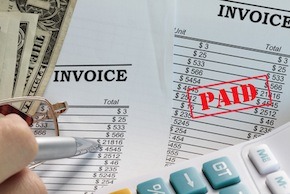 Factoring is a transaction in which a business sells accounts receivables or invoices. These represent money that is due from a customer sometime in the future for cash today. Factoring allows a business to convert its receivables into instant cash should it need an emergency capital infusion. Somewhat like a discounted note, the receivable is discounted to the investor for the right to receive a payment that was billed. They are paid at full face value.
Factoring is a transaction in which a business sells accounts receivables or invoices. These represent money that is due from a customer sometime in the future for cash today. Factoring allows a business to convert its receivables into instant cash should it need an emergency capital infusion. Somewhat like a discounted note, the receivable is discounted to the investor for the right to receive a payment that was billed. They are paid at full face value.
Many small and mid-size companies in safe industries such as medical, transportation, and manufacturing services (to name a few) face cash flow problems from time to time. Equipment breakdown, overhead costs, corporate tax bills and other financial obligations may cause major cash flow problems. If the company has a problem getting bank financing or an extension on an existing line of credit, factoring can solve their immediate cash flow crisis and allow them to continue to operate.
Here is an example of factoring invoices in a self-directed IRA:
Terry owns a commercial landscaping company. He has a contract with the local city government to provide landscaping services throughout the city. Terry provides the service and bills the city for the negotiated amount due. Generally speaking, city governments can take up to 30 days or more to pay their invoices. Terry needs cash now to make payroll. He decides to factor this receivable to an investor who uses his self-directed IRA to advance the cash to Terry for the amount of the invoice less the discount that Terry agreed to take. The investor will receive the full amount of the invoice when the city pays Terry.
Many investors have used their self-directed IRAs to factor receivables. The IRA purchases the invoice from the client, then collects payment from the client’s customer. The difference between what the IRA bought and what is being paid is the profit from that receivable. The profit comes back into the IRA tax-deferred or tax-free if a ROTH IRA advanced the money.
Since many companies utilize factoring as a secondary tool, this type of alternative investment has become a viable option. As with every investment, the IRA owner needs to perform proper due diligence to ensure that the invoice is solid, and to protect against the possibility of non-payment.
Another option rather than a direct purchase on a receivable is to work with companies that raise capital and do factoring as a business. Either way, the key is to know what you are buying before you buy.
If you are interested in this process or wish to know what paperwork is needed to acquire these investments in your IRA, visit us at irainnovations.com. Feel free to contact us with any questions.



